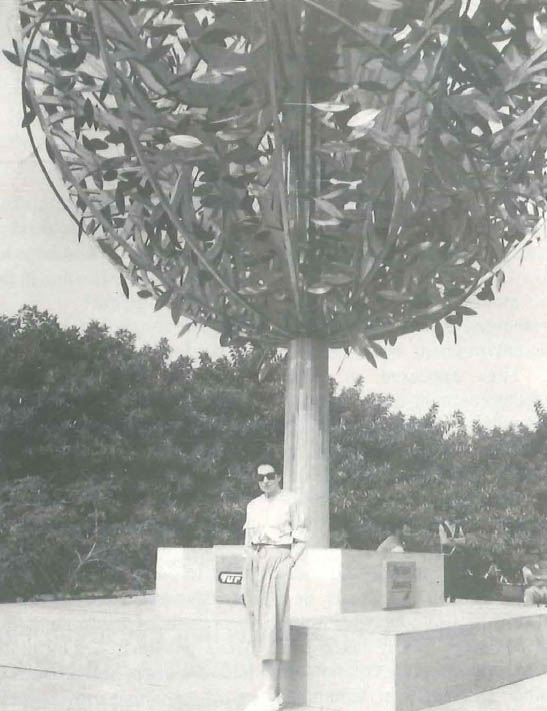The Athenian: Do you think that a shift in political decision-making, which would put the environment high on the agenda, appears feasible in the wake of the Earth Summit?
Mrs Goulandris: It ought to be feasible. In Rio a decisive step was taken towards the realization that the world cannot continue under the present circumstances. To stay alive a shift in policy-making is a must. Rio provided the ground for such a possibility. Agenda 21, for example, retains a series of admirable guidelines for governments to adopt and ultimately lead development to environmentally sound areas.
The Athenian: How would you describe the results of the summit in Rio?
Mrs Goulandris: Doubtful. They were not very impressive in particular as far as the economic convergence of northern and southern countries was concerned. Very limited commitment was apparent for the transfer of funds from the affluent north to the south. No safety exits were opened against uncontrolled development and reckless energy consumption.

The Athenian: Why did decisions and agreements fall well short of expectations?
Mrs Goulandris: In Rio, northern countries appeared bewildered despite their awareness of the sharpness of the ecological problems. They didn’t seem prepared to address what they saw as the global environmental crisis, just as they do not appear prepared to meet the obligations they bad agreed upon in Stockholm 20 years ago. So far, few northern countries, with the Scandinavian ones holding the lead, have fulfilled promises spelled out in Stockholm.
The Athenian: Is it wise to talk about the beginning of a new era since agreements were inefficient?
Mrs Goulandris: The agreements reached in Rio were viewed as inefficient due to the lack of definite and strict deadlines to lead development to environmentally sound areas. Northern countries’ governments preferred selfregulation and succeeded in avoiding controls attributing increased environmental responsibilities to large industry. But we cannot ignore the fact that the legally binding agreements on biodiversity and climate change, which were signed by 152 and by 154 countries respectively, are of vital importance to the environmental cause.

The Athenian: What about the discussions held; did they touch upon a wide range of environmental issues?
Mrs Goulandris: Despite the fact that talks on development were the driving force of the summit, which was encouraging, discussions were restricted to financial issues. Moreover, on the official level crucial topics bound to the environmental cause were evaded such as the way to a reduction in consumption on the part of the northern countries, the change in life style which would incur, and the ethics it would involve. These issues were only discussed at the Global Forum.
The Athenian: Could we say that in the wake of the Rio Summit sustainable development stands a chance in Third World countries?
Mrs Goulandris: Industrialized countries failed to provide the necessary international mechanisms for sound technology to the developing ones. Such mechanisms would have included health and education, necessary energy sources and family planning schemes, which are of the utmost importance to prevent environmental degradation in developing countries.
The Athenian: What was your impression of the Greek participation at Rio?
Mrs Goulandris: Greece, along with its southern European partners, Portugal, Italy and Spain, agreed to adopt an active role in enhancing the cause of the environment on the tracks of the prevalent ideas and ‘limits of the European ‘south’ within the EEC countries.
The Athenian: Was the notion of ‘global’, which is attributed to the environmental crisis, given enough attention?
Mrs Goulandris: An international mechanism, which would undertake the responsibility of measuring progress towards sustainable development of the south with the commitment of the north, was not formed in Rio. The notion of ‘global’ was not well identified or defined. So far the prevailing tendency appears to be for northern countries to focus on Third World countries with which they have had bonds from the past.
The Athenian: What was the message conveyed in Rio?
Mrs Goulandris: Rio has definitely provided the world with a starting point for a new era. Today it is obvious that as the Iron Curtain fe ll a poverty curtain would replace it; further success in reducing poverty between north and south should be the measure of global economic progress.
The Athenian: How would the number of ecologically-aware people increase? How could people around the world learn more about the Rio message?
Mrs Goulandris: Non-Governmental Organizations (NGOs) are bestowed with the task of communicating the message of the environmental cause to the people of the world. An organization that could undertake such a mission is the International Development and Research Center (IDRC) which is based in Canada. It is expected that it will extend its activities under the auspices of the UN. In autumn I will assume my position as member of the governing body in the IDRC.
“Europe’s ultimate goal; A new ecological ethos.”
Niki Goulandris
Niki Goulandris is known as a dynamic figure and an achiever in the campaigns for environmental awareness in Greece as well as in Europe. She is fluent in English, French and German.
She studied Political Science and Economics at the University of Athens and went on to postgraduate work at the University of Frankfurt, studying Political Theory under Professor Carlo Schmidt and Philosophy under Professors Horkheimer and Adorno, among the leading philosophers of the 1960s.
In 1964 she and her husband founded the Goulandris Natural History Museum.
In 1984 under the auspices of the Council of Europe the Goulandris Natural History Museum won recognition as the European Museum of the Year.
During her career Niki Goulandris has received numerous awards for her work: among these are the awards of the Academy of Athens and the British Linnaean Academy of which she was elected a member. Her name can be found on the Roll of Honor of the United Nations Environmental Global 500.
She holds an honorary doctorate from the Aristotelian University of Thessaloniki
In 1991 Niki Goulandris was the first Greek woman to receive the ‘Worrian of Europe’ prize. This award is presented by the European Community Commission to one European woman among the national candidates chosen by each member-state for their contributi9n to European integration.
Niki Goulandris was awarded the prize for her accomplishments concerning environmental protection in Greece.







